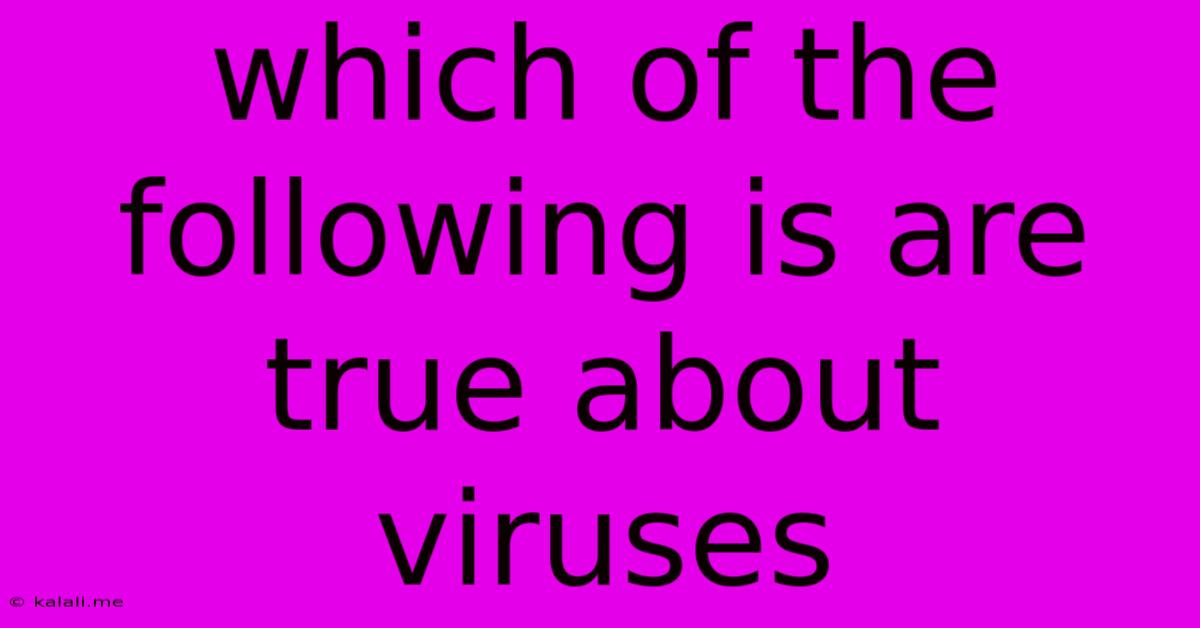Which Of The Following Is Are True About Viruses
Kalali
Jun 15, 2025 · 3 min read

Table of Contents
Which of the Following is/are True About Viruses? A Deep Dive into Viral Characteristics
Viruses are fascinating and often misunderstood entities. They blur the line between living and non-living organisms, leading to much debate and ongoing research. This article clarifies some common misconceptions and explores the fundamental characteristics that define viruses. Understanding these characteristics is crucial for comprehending their impact on human health, the environment, and even technological advancements like gene therapy.
Key Characteristics of Viruses: Debunking Myths and Clarifying Facts
Many statements about viruses circulate, some accurate, others inaccurate. Let's examine some common claims and determine their validity:
1. Viruses are acellular: TRUE. Unlike bacteria, fungi, and other living organisms, viruses are acellular, meaning they lack a cellular structure. They consist of genetic material (either DNA or RNA) enclosed in a protein coat called a capsid. Some viruses also have an outer lipid envelope. This simple structure is a key difference distinguishing them from cellular organisms.
2. Viruses can replicate independently: FALSE. This is a crucial point. Viruses are obligate intracellular parasites. This means they cannot replicate on their own. They require a host cell's machinery – its ribosomes, enzymes, and energy sources – to reproduce. They hijack the host cell's processes, forcing it to produce more viral particles.
3. Viruses are sensitive to antibiotics: FALSE. Antibiotics target specific structures and processes within bacterial cells. Since viruses lack these structures, antibiotics are ineffective against them. Antiviral medications, on the other hand, work by targeting specific stages of the viral life cycle, like preventing viral entry into the host cell or inhibiting viral replication.
4. Viruses can infect all types of organisms: TRUE. Viruses have an incredibly broad host range. They infect bacteria (bacteriophages), archaea, fungi, plants, animals, and even other viruses. The specificity of a virus is determined by the interaction between viral surface proteins and receptors on the host cell. This specificity explains why certain viruses only infect specific species or even cell types within a species.
5. Viruses evolve rapidly: TRUE. Viral genomes, particularly RNA viruses, mutate at a high rate. This high mutation rate allows viruses to adapt quickly to new environments and evade host immune responses. This is a major challenge in developing effective vaccines and antiviral treatments. Influenza viruses, for example, are notorious for their rapid evolution, requiring yearly updates to vaccines.
6. Viruses are always harmful: FALSE. While many viruses cause diseases, some have beneficial roles. For example, bacteriophages, viruses that infect bacteria, are being explored as alternative treatments for bacterial infections. Furthermore, some viruses integrate their genetic material into the host genome, potentially contributing to evolutionary changes over time.
Conclusion: Understanding Viral Biology for a Healthier Future
Understanding the fundamental characteristics of viruses – their acellular nature, obligate intracellular parasitism, insensitivity to antibiotics, broad host range, rapid evolution, and varied impact – is critical. This knowledge helps us develop effective prevention and treatment strategies, appreciate the complex interplay between viruses and their hosts, and explore the potential benefits of viral manipulation in areas like gene therapy. Further research continues to unveil the intricate world of virology, promising new discoveries and innovations in the years to come.
Latest Posts
Latest Posts
-
Ambedkar Overseas Vidya Nidhi For Sc St Students
Jun 16, 2025
-
Which Joint Is Used With A Plug And Slot Weld
Jun 16, 2025
-
What Is The Lcm Of 3 6 9
Jun 16, 2025
-
Which Phase Of The Scientific Method Comes First
Jun 16, 2025
-
The Outermost Layer Of The Sun Is Called
Jun 16, 2025
Related Post
Thank you for visiting our website which covers about Which Of The Following Is Are True About Viruses . We hope the information provided has been useful to you. Feel free to contact us if you have any questions or need further assistance. See you next time and don't miss to bookmark.